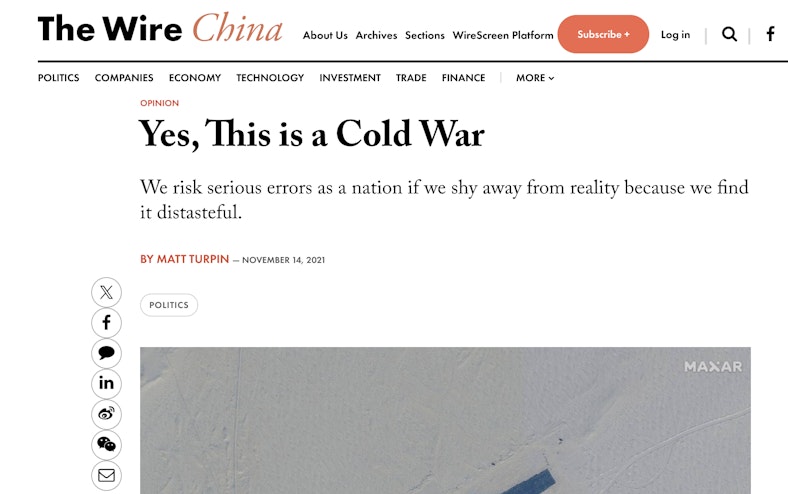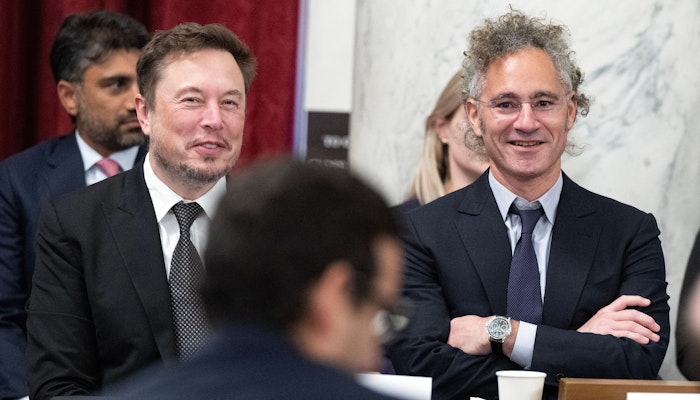Data-mining company Palantir is poised to turbocharge its sales to the U.S. military under President Donald Trump, amid signs that his administration plans to loosen the hold of traditional defense contractors and tap Palantir executives for key government positions.
But Palantir has also been laying the groundwork for a much deeper infiltration of Washington, building a sprawling influence network designed to secure government business for years to come, a new Tech Transparency Project (TTP) investigation has found.
TTP found that Palantir’s hiring of government officials is more extensive than previously reported, with the company stocking up on veterans of the White House, Defense Department, CIA, and Congress. The investigation also identified a robust revolving door between Palantir and the Pentagon office tasked with integrating commercial technology into military operations—a unit critical to Palantir’s government sales.
Over the past several years, Palantir has dramatically increased its lobbying budget, in one quarter even surpassing the spending of longtime “Beltway bandit” defense contractor Northrop Grumman, the investigation found. At the same time, Palantir is investing in soft influence efforts, establishing a non-profit foundation that seeks to shape D.C. policy discussions in the company’s favor through academic papers, conferences, and public commentary.
Many of Palantir’s D.C. hires are China hawks who warn that Beijing poses growing national security threat to the U.S. Such messaging helps the company make the case that the Pentagon should buy more artificial intelligence and software from private sector companies—like Palantir—to counter the Chinese military. Palantir co-founder and Chairman Peter Thiel is known for taking a similar anti-China stance.
TTP’s findings show that despite its reputation as a cutting-edge upstart, Palantir is drawing heavily from a more traditional corporate playbook when it comes to swaying Washington decision makers. Many of Palantir’s tactics mirror those of experienced D.C. hands like Google, which has spent the past decade-plus building a sprawling influence network via traditional lobbying, revolving door hires, and funding of academic research. These efforts are helping Palantir establish itself as a permanent presence in Washington, regardless of administration.
Palantir did not respond to a request for comment on TTP's findings.
Trump embrace
Palantir is well positioned to advance its interests under President Trump. Thiel is a longtime mentor to Vice President JD Vance and, despite dialing back his public support for Trump during the 2024 campaign, was reportedly a key player in urging Trump to pick Vance as his running mate. He's expected to have significant influence with the administration through his ties to various Trump officials, and he threw a splashy party in Washington ahead of Trump's inauguration, cementing his status as a D.C. power player.
Another of Palantir’s co-founders, venture capitalist Joe Lonsdale, reportedly helped set up and provided an early donation to the pro-Trump America PAC, which became a vehicle for Elon Musk to pump tens of millions of dollars into Trump’s campaign.
Following Trump’s victory, Palantir saw its stock surge amid investor expectations that it will benefit from Trump administration spending on defense and other programs. Musk, who is leading the so-called Department of Government Efficiency (DOGE) for Trump, has said the Pentagon and intelligence agencies should open up to “entrepreneurial companies”—comments that suggest Palantir and other upstarts may have a leg up on traditional defense contractors. Trump's newly confirmed Defense Secretary, Pete Hegseth, has also signaled he wants to reform the Pentagon's acquisition process and speed up deployment of emerging technologies, an agenda that could favor Palantir.
The head of Palantir’s defense business, former U.S. Rep. Mike Gallagher (R-Wisc.), wasted little time in seeking inroads with Hegseth, calling the former Fox News host a "patriot" the day after Trump announced he would nominate him. Since the election, Palantir has hired a Trump-connected lobbying firm, Miller Strategies, and backed a new trade group, the New American Industrial Alliance, which advocates for gutting government regulations and overhauling the Pentagon’s work with defense contractors. The group is being advised by multiple Trump world figures.
According to a recent report in Punchbowl News, Palantir has also hired Machalagh Carr, who served as chief of staff to former House Speaker Kevin McCarthy and is the wife of Trump FCC Chairman Brendan Carr, as head of global policy.
Meanwhile Trump is starting to bring Palantir figures into his administration. He nominated Jacob Helberg, a senior advisor to Palantir CEO Alex Karp and a major campaign donor, to be the top economic policy and trade official at the State Department. Helberg served on a congressional advisory panel that recommended the U.S. launch a “Manhattan Project-like” program to beat China on AI.
The president also hired Gregory Barbaccia, Palantir's former head of intelligence and investigations, as federal chief information officer. And Trump is reportedly considering Palantir’s chief technology officer, Shyam Sankar, for a high-level Pentagon job guiding research and development. Days before the election, Sankar published a 4,000-word manifesto calling for a “reformation” of the Defense Department’s contracting process. He made many of the same points at a recent Senate Armed Services Committee hearing.
Palantir and Anduril, another Thiel-backed defense firm, announced a partnership in December to train AI with U.S. military data and are reportedly in talks with a consortium of other companies including Musk's SpaceX and ChatGPT maker OpenAI to jointly bid on U.S. government contracts.
Another notable development: The contingent of young men playing a key role in Musk's DOGE takeover of federal government infrastructure includes a former Palantir intern and a Thiel fellow, according to a report in Wired.
Asked about the impact of DOGE during a recent earnings call to discuss fourth-quarter 2024 results, Palantir CEO Karp suggested his company would benefit from Musk's efforts.
"We love disruption, and whatever’s good for America will be good for Americans and very good for Palantir," he said. "There will be ups and downs. There’s a revolution. Some people are going to get their heads cut off. We’re expecting to see really unexpected things and to win."
Revolving door
Palantir's high-level moves with Trump world have grabbed media headlines, but the company has also assembled an array of former government officials who are helping it burrow deep inside the U.S. defense establishment, TTP’s investigation found. Some of these ex-officials have experience in the first Trump administration, but at least one is an Obama veteran and others are technical and policy experts who have worked in both Democratic and Republican administrations.
For example, Palantir’s team includes Matthew Turpin, who served as the director of China for the National Security Council in the first Trump White House and as senior China advisor to Trump’s then-commerce secretary, Wilbur Ross. During an earlier stint at the Pentagon from 2013 to 2017, Turpin advised the chairman of the Joint Chiefs of Staff on China issues and assisted with the Defense Innovation Initiative, a program aimed at developing technologies to sustain the U.S. military's competitive advantage.
Since joining Palantir as a senior advisor in 2019, Turpin has repeatedly argued the U.S. is in a cold war with China, a struggle that he warns “will be daunting and will likely consume our attention for decades.” At a June 2024 Hoover Institution event about the future of Taiwan, Turpin said that U.S. defense spending has “stagnated” over the past decade as the Chinese threat has increased. “We are essentially facing a far more capable PLA [People’s Liberation Army] that is expanding its modernization and capabilities, and we are finding ourselves being spread really incredibly thin,” he said.

Palantir's Turpin has repeatedly argued the U.S. is in a cold war with China.
Another notable Palantir hire is Wendy Anderson, an executive with Pentagon experience who joined the company in 2020 and today holds the title of senior vice president of federal and national security. Anderson held a slew of top positions at the Defense Department during the Obama administration, including deputy chief of staff to then-Defense Secretary Chuck Hagel. She also served as chief of staff to Obama’s commerce secretary, Penny Pritzker. Earlier in her career, she worked as a staffer on the Senate Homeland Security Committee and as a Democratic Senate aide.
As a Palantir executive, Anderson served as a member of the Atlantic Council’s Commission on Defense Innovation Adoption alongside leading figures in the national security establishment. The committee’s January 2024 final report, which named Palantir as one of its corporate sponsors, advocated for reducing bureaucratic barriers and creating new incentives for tech companies to do business with the Pentagon. It also urged Congress to provide $250 million to scale technologies that “address the preeminent challenge of deterring the People’s Republic of China.”
In June 2023, Anderson co-authored an op-ed with her fellow Atlantic Council commissioner Michèle Flournoy pushing the Defense Department to more rapidly adopt software systems outside its traditional acquisition process. “Time is running short as China aims to complete its military modernization program by 2027,” they warned. Flournoy, who served as the Pentagon’s policy chief under Obama, has been floated repeatedly as a potential defense secretary for Democratic presidential candidates, including, most recently, Kamala Harris.
Several other national security and intelligence experts with past government experience have moved to Palantir in recent years. They include:
Alexander Alden, a veteran of the first Trump administration who joined Palantir in 2021. Described as a “Trump loyalist,” Alden served as a special assistant at the Pentagon from 2017 to 2018 before becoming senior director on Trump’s National Security Council, responsible for emerging technologies and defense policy. Alden later moved to the Trump State Department, where he was tasked with strengthening EU-U.S. relations while “countering Chinese regional influence.”
Jamie Fly, a former aide to Sen. Marco Rubio (R-Fla.), Trump’s newly installed secretary of state. Fly served as a foreign and national security affairs advisor to Rubio from 2013 to 2017 and did an earlier stint in the George W. Bush administration at both the Pentagon and National Security Council. He joined Palantir in August 2023. During Fly’s time on Rubio’s staff, the senator repeatedly pointed to China as a national security threat and proposed new sanctions against China over its activities in the South China Sea.
Geof Kahn, a Central Intelligence Agency veteran who worked on the transition team for the first Trump administration, assisting then-Rep. Mike Pompeo (R-Kan.) during his confirmation process to be CIA director. Kahn later served as senior adviser to Pompeo and the CIA’s chief operating officer. He previously spent five years as policy director for the House Intelligence Committee from 2011 to 2017, including during the chairmanships of Republican Reps. Mike Rogers (Mich.) and Devin Nunes (Calif.). Kahn joined Palantir in January 2023.
The individuals mentioned in this section did not immediately respond to requests for comment.
Key Pentagon office
Palantir has had a particularly active revolving door with the Pentagon’s Chief Digital and Artificial Intelligence Office (CDAO), TTP’s investigation found. The office, which oversees adoption and deployment of data, analytics, and artificial intelligence programs throughout the Defense Department, is a critical government unit for Palantir’s contracting business.
TTP identified multiple individuals who have gone from the CDAO or CDAO-adjacent roles to Palantir and vice versa:
· Greg Little, one of the first Pentagon officials to run CDAO, joined Palantir as a senior counselor in August 2023.
· David Spirk, who served as chief data officer at the Pentagon and contributed to the creation of CDAO, joined Palantir as senior counselor in July 2022.
· Maura Thompson, who held various logistics positions at CDAO and the Joint Chiefs of Staff, is now a deployment strategist at Palantir.
· Trevor Austin, who worked as a Palantir engineer early in his career, is now CDAO’s acting chief technology officer.
· Will Thibeau, who worked as deployment strategist at Palantir, later did a stint at CDAO as a policy analyst.
· Joseph Larson, who headed AI policy and strategy at Palantir, went on to serve as a deputy chief at CDAO.
Thibeau told TTP he was a contractor at CDAO, not a CDAO employee, but declined to comment. The other individuals listed above did not immediately respond to requests for comment.
Larson, the last example on the list, provides an interesting case study, bouncing between Palantir, the Pentagon, and Anduril.
Following a four-year stint working on AI policy and strategy for Palantir, Larson joined the Pentagon in October 2016 as deputy chief of Project Maven, the military artificial intelligence program. While Larson was at Project Maven, Anduril reportedly won a contract to work on the project after Google dropped out following an internal employee protest against providing technology for warfare. Two months after Larson left the Pentagon in 2019, it was reported that Palantir had also secured a Maven contract.
Larson briefly worked for an AI startup after leaving the Pentagon and then took a job at Anduril. Another turn of the revolving door brought him back to the Pentagon as chief of Project Maven and later as a deputy chief of the newly created CDAO. He returned to Anduril as a senior vice president in March 2024.
Larson did not immediately respond to questions and a request for comment.
Lobbying Surge
Palantir has also been steadily boosting its lobbying presence in Washington and spent close to $5.8 million on lobbying in 2024, up from just over $1 million in 2016.
In some quarters, Palantir has approached the lobby spending of some of the biggest U.S. defense contractors, a sign of its ambitions to grab a bigger slice of government business. In the fourth quarter of 2023, Palantir spent nearly $2.6 million on lobbying, more than Northrop Grumman ($2.1 million) and within striking distance of RTX, formerly known as Raytheon ($2.7 million). Palantir’s disclosures show its lobbying largely focused on defense and other government spending bills as well as topics like AI regulation.
One of the in-house lobbyists Palantir employed last year, Allen Souza, is a veteran Republican congressional aide who served as national security advisor to House Speaker Kevin McCarthy (R-Calif.) and did a stint in the Trump National Security Council in 2020-21. (In May 2024, Souza returned to Congress as a Senate Intelligence Committee staffer and oversight counsel.)
Palantir also tapped more than a half dozen outside lobbying firms in 2024, disclosures show. The lobbyists at these firms have worked for lawmakers of both parties as well as the congressional committees that oversee military and government spending. For example, one outside lobbyist for Palantir, Tyler Jensen, served as an aide to Rep. Adam Smith (Wash.) when Smith was lead Democrat on the House Armed Services committee. Another outside lobbyist, William Duhnke, was a longtime Republican staff director for Senate committees including Appropriations and Intelligence. (Following a stint as a lobbyist, Duhnke is now back in Congress as a senior policy advisor to Speaker Johnson.)
Souza, Jensen, and Duhnke did not immediately respond to requests for comment.
Palantir’s CEO, Alex Karp, has also been a frequent presence in Washington, taking part in everything from a congressional AI forum to an awards gala. Karp backed Kamala Harris in the 2024 election, but since Trump’s victory, he has said the incoming Trump administration has a “massive mandate” to show it can deliver results to the American public and said he “wholeheartedly” supports the new Musk-led DOGE.

Palantir co-founder and CEO Alex Karp (right) sitting next to Elon Musk at a bipartisan AI forum in Congress, September 2023.
Soft Power
Lobbyists have helped Palantir establish links with congressional leadership and key committees that are essential to its bottom line. But the company has also engaged in a softer form of influence building, creating a foundation to promote policy ideas that serve to advance its Washington agenda.
The company quietly launched the Palantir Foundation for Defense Policy and International Affairs in 2023. The organization, which was granted non-profit tax status in March 2024, describes itself as non-partisan and says it plans to sponsor academic research, fellowships, and conferences on national security issues.
The foundation’s inaugural Atlantic & Pacific Forum, held in May 2024, focused on the role of AI in warfare—a topic central to Palantir’s product offerings. The event, co-sponsored by Foreign Policy magazine, featured a number of speakers with defense tech experience. They included Linda Lourie, who served in the White House Office of Science and Technology Policy from 2021 to 2022 and previously worked at the Pentagon in a variety of roles including general counsel of the Defense Innovation Unit (DIU). The DIU is devoted to accelerating the military's adoption of commercial technology. Another speaker, Nina Kollars, served as a special adviser to the undersecretary of defense for research and engineering in the Biden administration.
Lourie and Kollars did not immediately respond to requests for comment.
The Palantir foundation also publishes a journal about technology and national security called The Republic. The first issue, released in July 2024, included a piece by Palantir’s Jacob Helberg that argues that “AI is the pivotal technology in U.S.-China competition” and “the U.S. government and Silicon Valley must seriously partner to protect democracy from the autocrats looking to dismantle it.”
By funding conferences, academic papers, and policy commentary, Palantir can create an echo chamber effect around ideas that are favorable to its business interests.
The foundation’s plans for fellowships also appear to be a part of this strategy. While its website gives only a bare-bones description of the fellowship program, such initiatives can be powerful tools for influencing government. As TTP has previously reported, former Google CEO Eric Schmidt funded a program that placed dozens of fellows in influential Biden administration posts that often overlap with his private financial interests.
Schmidt is closely tied to Peter Thiel and Palantir. Both Schmidt and Thiel back America’s Frontier Fund (AFF), a nonprofit venture fund that invests in Palantir and other U.S. defense tech companies. (An AFF representative once reportedly boasted that war with China would be good for the fund's portfolio.) Schmidt has urged the U.S. government to invest more in AI research and development to compete with China, without mentioning his personal investments in AI startups that could benefit from such R&D.
Conclusion
Palantir has seen its shares soar in recent weeks, boosted by strong financial results and expectations that the company will benefit from the second Trump administration. The company’s key government contracts include deals to provide AI targeting technology (Maven Smart System) to the U.S. military and a battle management system (TITAN) to the U.S. Army.
To keep those government sales flowing, Palantir is building an extensive influence network in Washington, following a strategy honed by Big Tech and other corporate giants. The company has hired a slew of well-connected players from Congress and federal agencies, ramped up lobbying activity, and created a foundation to bankroll policy-shaping research, conferences, and public commentary. This effort, which is mostly taking place below the radar, reflects Palantir’s ambitions to establish itself as a permanent player in the U.S. defense-intelligence sector in the Trump years—and beyond.




